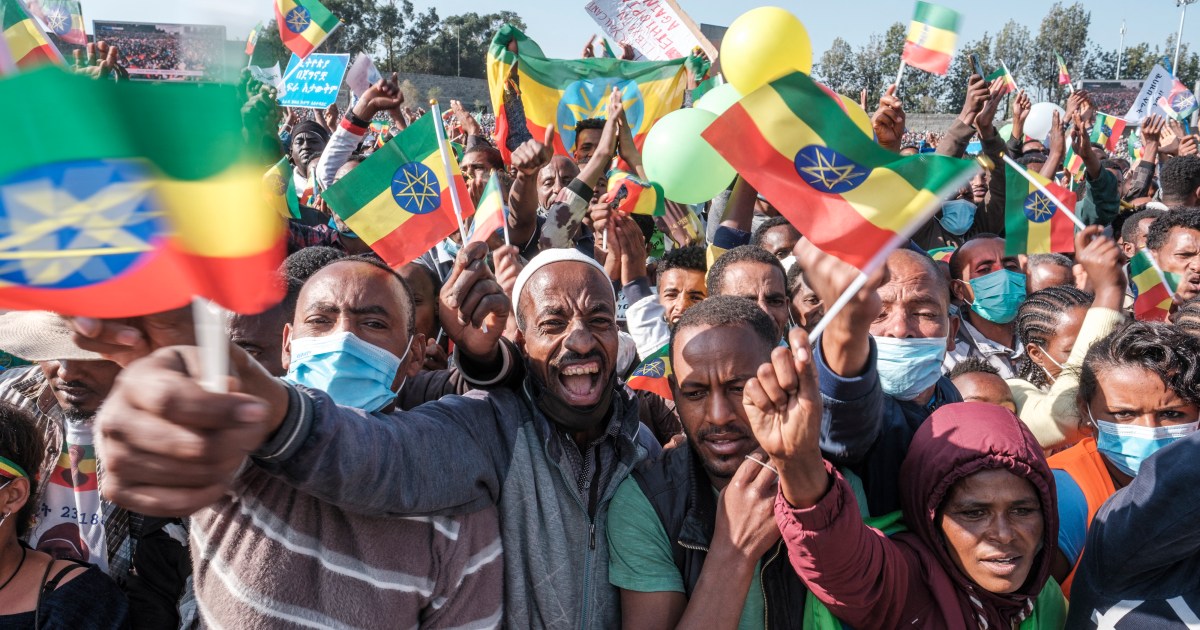Mass demonstrations erupted in Ethiopia in support of the government of Prime Minister Abiy Ahmed in the face of the rebel movements led by the Tigray Liberation Front, which announced on Sunday that it is 270 kilometers from the capital, while a US official said that his country's tireless efforts to stop the fighting collided with the desire of both sides of the conflict to continue fighting.
Hundreds of thousands demonstrated in several Ethiopian cities - on Sunday - against the Tigray fighters, in conjunction with increasing pressure on the central government as a result of the militants' advance towards the capital, Addis Ababa.
Ethiopians gathered in demonstrations in Al-Saleeb Square - in the center of the capital, Addis Ababa - to denounce the Tigray Liberation Front and its allied factions, and to emphasize the support of the Ethiopian government and army forces.
Some protesters denounced the US government and foreign powers who called for a ceasefire after the year-long war intensified, which has claimed thousands of lives amid the advance of opposition forces early last week.
The United States, the United Nations Security Council, the African Union, Kenya and Uganda have called over the past few days for a ceasefire.
Abiy Ahmed's government has vowed to continue the fight.
She said she was responsible for securing the country and urged international partners to support democracy in Ethiopia.
Some protesters in Meskel Square in central Addis Ababa wrapped their bodies in the national flag.
Many singled out the United States for criticism.
One of the demonstrators raised a banner that read, "Shame on you, America," while another banner appeared saying, "The United States should stop sucking Ethiopia's blood."
In western Ethiopia, demonstrations took place in the city of Asosa, the capital of the Benishangul region, in support of the army and government forces.
The demonstrators chanted slogans against the Tigray People's Liberation Front, which they described as a terrorist movement.
Field developments
On the ground, the spokesman of the Tigray People's Liberation Front, Getachew Reda, confirmed that his fighters are advancing towards the south and "approaching Atay", 270 kilometers north of the capital, as well as towards the east towards a mile on the road to Djibouti, which is the main supply of Addis Ababa.
In statements to Agence France-Presse, Reda said, "Addis Ababa is a melting pot in which people of all interests live, and to say that Addis Ababa will turn into a bloodbath if we enter it is very ridiculous. I do not think that this hypothesis (...) has credibility."
Reda stressed that controlling the capital is not a "goal."
"We are not particularly interested in Addis Ababa, but we want to make sure that Abi (Ahmed) does not pose a threat to our people," he said.
But he noted that if the prime minister did not go, the rebels would "of course" take over the city.
At the same time, he denied that the Front is seeking to regain the power that it lost in 2018. He said, "I can assure you that this does not concern us. We simply want to make sure that the voice of our people is heard, and that they are exercising their right to self-determination, especially by organizing a referendum for a determination." If he wants to stay in Ethiopia or become independent."
The Tigray Liberation Front announced during the past few days that it had taken control of several strategic cities in the Amhara region, after it had seized all areas of the Tigray region last June.
The challenge facing Addis Ababa escalated with the announcement of 9 factions - the day before yesterday, Friday - the formation of a new alliance to overthrow Abi Ahmed's government under the name "The United Front of the Ethiopian Federal and Confederation Forces."
endeavors falter
Politically, a diplomatic source told Al Jazeera that the efforts of the American envoy to the Horn of Africa, Jeffrey Feltman, who is visiting the capital, Addis Ababa, to end the crisis in Ethiopia have faltered.
The source stated that Ethiopia rejected Feltman's proposal to hold unconditional negotiations, as the government is currently facing the Tigray Front as a "terrorist" group and demands the immediate withdrawal of its militants from the Amhara region without preconditions.
The same source added that the two sides - the US and the Ethiopian - differed over the nature of the negotiations, as Addis Ababa said that it is the one who determines this without the interference of external parties.
Today, Sunday, Politico quoted a US State Department official as saying that the lack of flexibility on both sides in Ethiopia is the reason for the continuation of the war.
The official said that Washington had made unremitting efforts to stop the civil war in Ethiopia, but to no avail.
He added that "Washington is trying to push for a peaceful solution in Ethiopia, but the warring parties do not want that."

